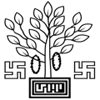Objective
-
• To improve the nutritional and health status of children in the age-group of 0-6 years;
-
• To lay the foundation for proper psychological, physical and social development of the child;
-
• To reduce the incidence of mortality, morbidity, malnutrition and school dropouts;
-
• To achieve effective co-ordination of policy and implementation amongst the various departments to promote child development; and
-
• To enhance the capability of the mother to look after the normal health and nutritional needs of the child through proper nutrition and health education.
Sevices
Integrated Child Development Services is Centrally-Sponsored and will provide the following six services to the beneficiaries.
These services are provided from Anganwadi centres established mainly in rural areas and staffed with frontline workers.
Review the child's immunization records and ensure they are up-to-date with recommended vaccines for their age group.Children below 6 years: Pregnant & Lactating Mother (P&LM)
Administer any vaccines that are due or overdue according to national guidelines.
Non-formal Pre-school Education is imparted to the children in the Anganwadi by Anganwadi Worker. this service provided under the ICDS scheme and caters to the development needs of children between 3 and 6 years of age.
This includes health care of children less than six years of age, antenatal care of expectant mothers and postnatal care of nursing mothers. The various health services provided for children by anganwadi workers and Primary Health Centre (PHC) staff, include regular health check-ups, recording of weight, immunization, management of malnutrition, treatment of diarrhoea, de-worming and distribution of simple medicines etc.
During health check-ups and growth monitoring, sick or malnourished children, in need of prompt medical attention, are referred to the Primary Health Centre or its sub-centre.
During health check-ups and growth monitoring, sick or malnourished children, in need of prompt medical attention, are referred to the Primary Health Centre or its sub-centre. The anganwadi worker has also been oriented to detect disabilities in young children. She enlists all such cases in a special register and refers them to the medical officer of the Primary Health Centre/ Sub-centre.
Beneficiaries
-
• Children in the age group of 0-6 years
-
• Pregnant women and Lactating mothers
-
• Adolescent Girls (14-18 years) in Aspirational Districts and North-eastern States
Schemes
The scheme was started in 1975 and aims at the holistic development of children and empowerment of mother. It is a Centrally-Sponsored scheme. The scheme primarily runs through the Anganwadi centre. The scheme is under the Ministry of Women and Child Development.
Best Practice may be defined as a practice with various special characteristics such as innovativeness, ability to lead an actual change, having an impact on policy environment, replicable and sustainable (ability to self-support), contribute to increase efficiency of the initiative (that is, optimum use of resources to enhance outputs and outcomes) and increase the effectiveness (that is, its contribution to the achievement of the set objectives of the scheme in which the practice occurs).
The revised Scheme will address the inter-generational problem of malnutrition by focusing on adolescent girls keeping in view the life cycle approach. The revised scheme aims at providing nutritional support to adolescent girls in the age group of 14 to 18 years in the identified areas of the country for improving their health and nutritional status under the nutrition component and providing them IFA supplementation, Health check-up and Referral Service, Nutrition & Health Education and Skilling etc. under non-nutrition component of the Scheme.
Nutrition Norms: Rs. 237.50 per beneficiaries for 25 days per month.
No. of feeding Days: 300 days
As per Guideline under “Mission Saksham Anganwadi and Poshan 2.0”, issued by Ministry of Women and Child Development, GoI, Scheme for Adolescent Girls has been revised and targeted beneficiaries have also been revised to AGs in the age group of 14-18 years.
Scheme for Adolescent Girls will be implemented in the 177 projects of 13 aspirational districts.These districts are i)Araria, ii)Aurangabad, iii)Banka, iv)Begusarai, v)Gaya, vi)Jamui, vii)Katihar, viii)Khagaria, ix)Muzaffarpur, x)Nawada, xi)Purnia, xii)Sheikhpura, and xiii)Sitamarhi.
Mission POSHAN 2.0 is an Integrated Nutrition Support Programme. It seeks to address the challenges of malnutrition in children, adolescent girls, pregnant women and lactating mothers through a strategic shift in nutrition content and delivery and by creation of a convergent eco-system to develop and promote practices that nurture health, wellness and immunity. Poshan 2.0 will seek to optimize the quality and delivery of food under the Supplementary Nutrition Program.
Mission Poshan 2.0 will contribute to human capital development of the country; address malnutrition challenges; promote nutrition awareness and good eating habits for sustainable health & well-being and address nutrition related deficiencies through key strategies. Under the programme, nutritional norms and standards and quality and testing of THR will be improved and greater stakeholder and beneficiary participation will be promoted besides traditional community food habits. Poshan 2.0 will bring 3 important programmes/schemes under its ambit, viz., Anganwadi Services, Scheme for Adolescent Girls and Poshan Abhiyaan.
Continuous efforts are made by the government for the empowerment of girls. For this, many schemes are launched by the government from time to time. Today we are going to provide you information related to one such scheme launched by the Bihar government, whose name is Mukhyamantri Kanya Utthan Yojana. By reading this article you will get all the important information related to this scheme. Like what is Mukhyamantri Kanya Utthan Yojana?, its benefits, objectives, eligibility, features, important documents, application etc. So friends, if you want to get all the important information related to Mukhyamantri Kanya Utthan Yojana, then you are requested to read our article till the end.
To provide compensation to working women for loss of wages and to ensure their proper rest and nutrition. Improving the health of pregnant women and lactating mothers and reducing the impact of under-nutrition through cash incentives.
Saksham Anganwadi and Poshan 2.0 (hereinafter referred to as Poshan 2.0) is an Integrated Nutrition Support Programme. It seeks to address the challenges of malnutrition in children, adolescent girls, pregnant women and lactating mothers through a strategic shift in nutrition content and delivery and by creation of a convergent ecosystem to develop and promote practices that nurture health, wellness and immunity.
Mission Shakti- In 2022, National Creche Scheme (NCS) was revised and subsumed as part of the 'Palna' scheme under Mission Shakti. Aim- To provide day-care facilities for children (6 months to 6 years) of working mothers and to improve nutrition and health status of children.






